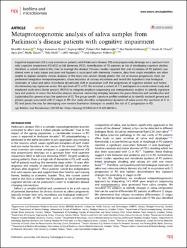| dc.contributor.author | Arıkan, Muzaffer | |
| dc.contributor.author | Demir, Tuğçe Kahraman | |
| dc.contributor.author | Yıldız, Zeynep | |
| dc.contributor.author | Nalbantoğlu, Özkan Ufuk | |
| dc.contributor.author | Korkmaz, Nur Damla | |
| dc.contributor.author | Yılmaz, Nesrin H. | |
| dc.contributor.author | Şen, Aysu | |
| dc.contributor.author | Özcan, Mutlu | |
| dc.contributor.author | Muth, Thilo | |
| dc.contributor.author | Hanoğlu, Lütfü | |
| dc.contributor.author | Yıldırım, Süleyman | |
| dc.date.accessioned | 2023-12-15T10:53:35Z | |
| dc.date.available | 2023-12-15T10:53:35Z | |
| dc.date.issued | 2023 | en_US |
| dc.identifier.citation | ARIKAN, Muzaffer, Tuğçe KAHRAMAN DEMİR, Zeynep YILDIZ, Özkan Ufuk NALBANTOĞLU, Nur Damla KORKMAZ, Nesrin H. YILMAZ, Aysu ŞEN, Mutlu ÖZCAN, Thilo MUTH, Lütfü HANOĞLU & Süleyman YILDIRIM. "Metaproteogenomic Analysis of Saliva Samples From Parkinson’s Disease Patients With Cognitive Impairment". Npj Biofilms and Microbiomes, 9.86 (2023): 1-10. | en_US |
| dc.identifier.uri | https://www.nature.com/articles/s41522-023-00452-x | |
| dc.identifier.uri | https://hdl.handle.net/11352/4689 | |
| dc.description.abstract | Cognitive impairment (CI) is very common in patients with Parkinson’s Disease (PD) and progressively develops on a spectrum from
mild cognitive impairment (PD-MCI) to full dementia (PDD). Identification of PD patients at risk of developing cognitive decline,
therefore, is unmet need in the clinic to manage the disease. Previous studies reported that oral microbiota of PD patients was
altered even at early stages and poor oral hygiene is associated with dementia. However, data from single modalities are often
unable to explain complex chronic diseases in the brain and cannot reliably predict the risk of disease progression. Here, we
performed integrative metaproteogenomic characterization of salivary microbiota and tested the hypothesis that biological
molecules of saliva and saliva microbiota dynamically shift in association with the progression of cognitive decline and harbor
discriminatory key signatures across the spectrum of CI in PD. We recruited a cohort of 115 participants in a multi-center study and
employed multi-omics factor analysis (MOFA) to integrate amplicon sequencing and metaproteomic analysis to identify signature
taxa and proteins in saliva. Our baseline analyses revealed contrasting interplay between the genus Neisseria and Lactobacillus and
Ligilactobacillus genera across the spectrum of CI. The group specific signature profiles enabled us to identify bacterial genera and
protein groups associated with CI stages in PD. Our study describes compositional dynamics of saliva across the spectrum of CI in
PD and paves the way for developing non-invasive biomarker strategies to predict the risk of CI progression in PD. | en_US |
| dc.language.iso | eng | en_US |
| dc.publisher | Springer Nature | en_US |
| dc.relation.isversionof | 10.1038/s41522-023-00452-x | en_US |
| dc.rights | info:eu-repo/semantics/openAccess | en_US |
| dc.title | Metaproteogenomic Analysis of Saliva Samples From Parkinson’s Disease Patients With Cognitive Impairment | en_US |
| dc.type | article | en_US |
| dc.relation.journal | Npj Biofilms and Microbiomes | en_US |
| dc.contributor.department | FSM Vakıf Üniversitesi, Edebiyat Fakültesi, Psikoloji Bölümü | en_US |
| dc.contributor.authorID | https://orcid.org/0000-0001-5162-2000 | en_US |
| dc.contributor.authorID | https://orcid.org/0000-0002-1173-1701 | en_US |
| dc.contributor.authorID | https://orcid.org/0000-0002-2752-1223 | en_US |
| dc.identifier.volume | 9 | en_US |
| dc.identifier.issue | 86 | en_US |
| dc.identifier.startpage | 1 | en_US |
| dc.identifier.endpage | 10 | en_US |
| dc.relation.publicationcategory | Makale - Uluslararası Hakemli Dergi - Kurum Öğretim Elemanı | en_US |
| dc.contributor.institutionauthor | Yıldız, Zeynep | |



















